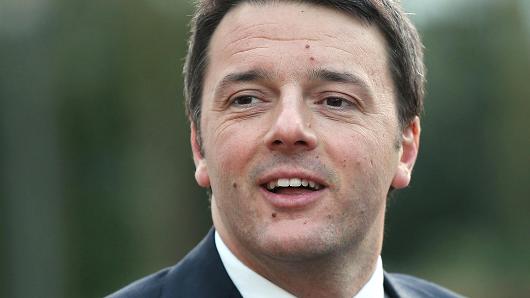Renzi faces pressure to stay in office as Italian referendum defeat looms

When a handful of European leaders met Barack Obama in Berlin this month to say their goodbyes, Italian Prime Minister Matteo Renzi informed the group that he may well lose power before the U.S. president.
While Obama leaves office on Jan. 20, Renzi has promised to resign if he does not win a Dec. 4 referendum on constitutional reform, opening the way for renewed political instability in the eurozone’s third largest economy.
“I have no desire to hang around if I lose,” Renzi told the gathering, according to a diplomatic source who was at the low-key Nov. 18 meeting.
Opinion polls now predict Renzi’s defeat, in what would be the third big anti-establishment revolt by voters this year in a major Western country, following Britain’s unexpected vote to leave the European Union and the U.S. election of Donald Trump.
Pressure is mounting on Renzi to drop his threat and instead agree to remain in power to deal with the fallout from a ‘no’ vote, including the risk of a full-blown banking crisis.
Obama himself said in October that Renzi should “hang around for a while no matter what” and a number of businessmen and senior government officials contacted by Reuters said they feared the worst if the prime minister abandoned his post.
“My personal opinion is that Renzi should stay,” Industry Minister Carlo Calenda said in an interview on Friday. “What needs to be considered … is what is good for the country.”
Three center-left politicians who are in regular contact with Renzi told Reuters that he would honor his word and immediately resign if he is beaten, worried that failure to do so would do irreparable damage to his political image.
The Italian president could appeal to Renzi’s sense of responsibility and ask him to seek a new mandate from parliament. His response might depend on the size of any defeat, with one advisor saying the 41-year-old premier could quit politics altogether if he suffers a huge snub next Sunday.
“He is young and impulsive,” said the official, who declined to be named. “If the result is terrible, he might decide to call it a day and do something else with his life.”
The referendum proposes constitutional reforms to strengthen the lower house of parliament and reduce the authority of the upper house Senate. Regions would lose some decision-making powers to bolster central government.
Renzi says the project is necessary to make Italy, which has had 63 governments since 1948, governable enough to enact reforms needed to revive its moribund economy. Opponents say it would reduce democratic checks and balances.
In the first week in December, Italy’s third largest bank Monte dei Paschi di Siena has to launch a 5 billion euro ($5.3 billion) cash call. Investors are not expected to jump in if political instability prevails, meaning the state will almost certainly have to intervene swiftly to stave off collapse.
Although business leaders support Renzi’s reforms, they have kept quiet during the referendum campaign, fearing they would prove the kiss-of-death in an era of anti-establishment angst.
But they are increasingly alarmed by the prospect of heavily indebted Italy drifting once more into political paralysis.








